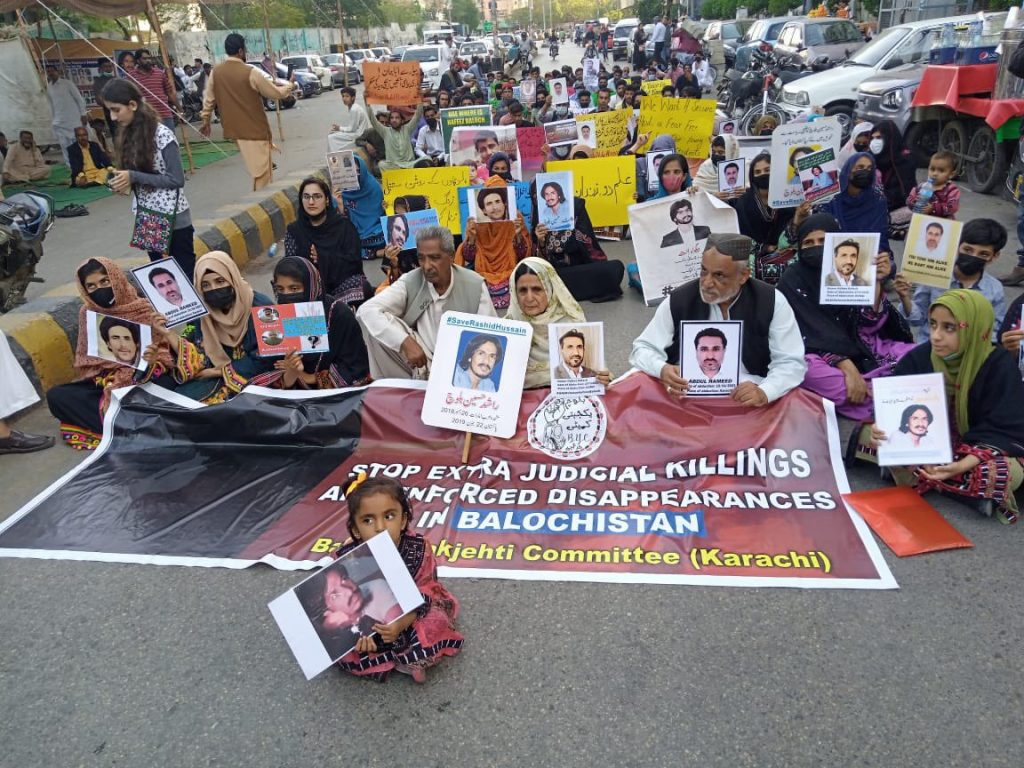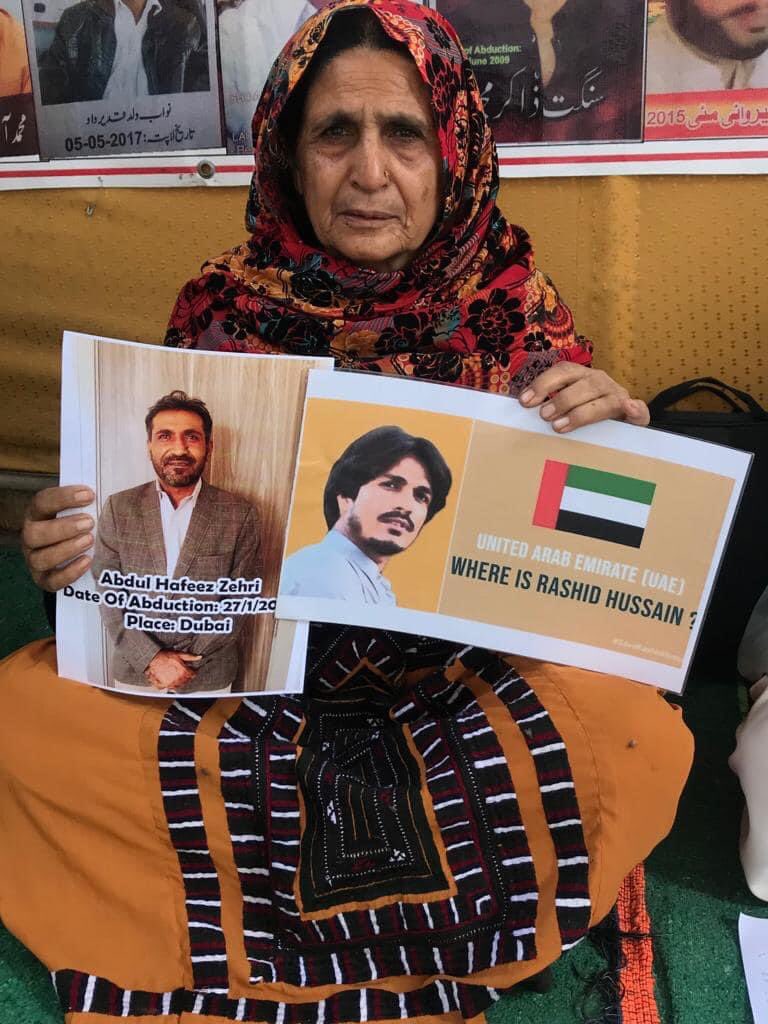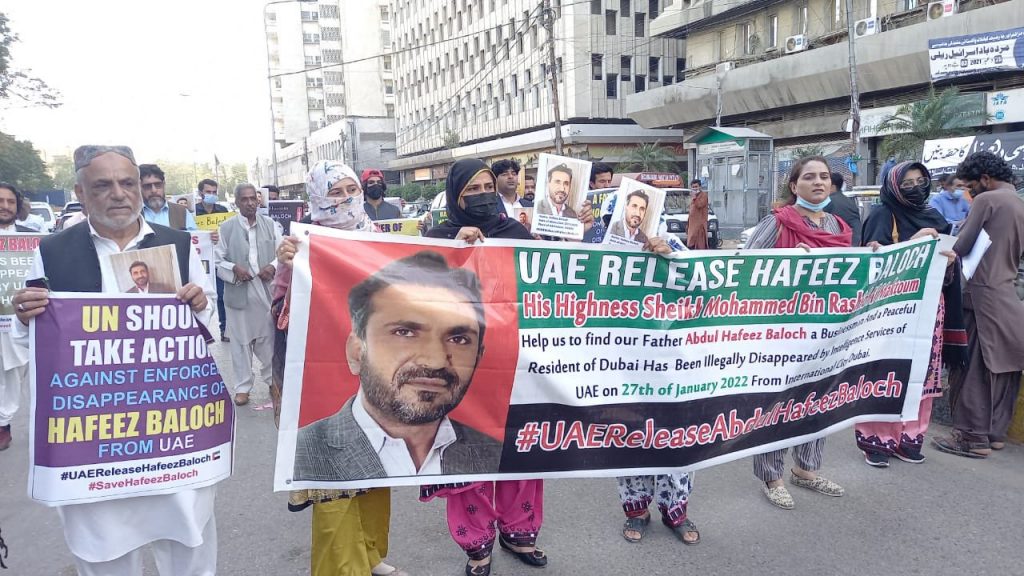At 1:00 AM on January 27th, 2022, someone knocked on the door and Rashida Baloch answered it, expecting to see her husband on the other side. But what she saw was not her husband, it was the watchman who guarded their building in the night. “Your husband was arrested by the police”, he told her. Rashida had not expected to hear that news. She was shocked. Considering the history of attacks on her husband and his family members, she knew that this day might come. But she had not expected it to come so soon, not in this country.
Abdul Hafeez Zehri was forcibly disappeared by the Emirati forces near his house in the International City residential area in Dubai. The forces were waiting for him in the parking lot of their building and when he pulled over, locked his car and headed in the direction of the house, carrying the groceries for tomorrow’s breakfast, he was ambushed and detained. The watchman stationed at the building witnessed the scene as the forces manhandled Hafeez into their car. The abductors identified themselves as members of the Dubai Police and UAE’s Security Industry Regulatory Agency (SIRA) and took Hafeez away with them. They also erased the CCTV footage of the cameras in the building before they left. Terrified, the watchman went straight to his house and informed his wife, Rashida Baloch, what had happened.
Rashida immediately went to the police station looking for her husband. The police said that they did not know about Hafeez’s arrest. They searched their records but could not find a single case against Hafeez that would merit his arrest. Rashida also went to the Airport police to look for her husband but was disappointed when the police told her, “they could not help”. Then she went to the AlKhawaneej Police Station and filed a first information report against the disappearance of her husband. She also went to the headquarters of the Crime Investigation Department to search for answers, but instead of answers, she got humiliation. According to Rashida, she and her children were insulted and pushed out of the building.
On January 31st, the Emirati intelligence officials called Rashida and asked for her husband’s passport, but she refused to hand it away. The next day, she received another call, this time from the Dubai Central Jail. The police officials asked her to come to the jail and claim the keys to her husband’s car. When Rashida asked where her husband was, she was told that “Abdul Hafeez was forcefully and illegally deported to Pakistan despite the obvious threat to his life there.” Hafeez was extradited without the proper documentation and against his consent and the consent of his family members. He was handed over to the forces who allegedly killed his minor brother and his father in cold blood; and forced him to leave everything behind and seek refuge in the UAE.
Background
Abdul Hafeez Zehri has had a sour relationship with the Pakistani state since day one. He comes from Zehri, a small town located some 120km from Khuzdar city. His family had moved to Khuzdar several years ago in search of employment and better living standards. His father, Haji Ramzan Zehri, had set up a burgeoning business there and made a name for himself. Everything was going great when the tragedy struck: in October 2010, the Pakistani security forces reportedly abducted his thirteen-year-old son Abdul Majeed Zehri from the Umer Farooq Chowk in Khuzdar. He was detained for a week and according to medical reports: he was brutally tortured in confinement and later his mutilated dead body was thrown on the Rabia Khuzdari Road. His body bore marks of extreme torture – his abductors had extinguished their cigarettes all over his body.
A few weeks later, unknown assailants torched his warehouses and his vehicles. Carrying gasoline in their hands, the assailants breached into Haji Ramsan’s house, intending to set it on fire. The householders woke up at the commotion and the assailants had to flee. They went on Haji Ramzan’s farmhouse and set his farmers’ house on fire.
It was later revealed that these assailants were in fact members of a “death squad,” a locally armed militia comprised of hardened criminals who allegedly work under the patronage of the Pakistani state. According to local activists, these militias do Pakistan’s bidding by spying on Baloch pro-independence fighters, carrying out enforced disappearances and targeting killing Baloch nationalists, student leaders, activists and sympathizers of the Baloch cause. To reciprocate for their service, the Pakistani state has given them a free hand: these death squads are involved in social crimes like ransom kidnapping, drug trafficking and robberies. They can kill someone in broad daylight and easily get away with it.
Majeed’s killing was still fresh in memory when the same forces struck again. In September 2011, a hand grenade bomb was hurled inside Haji Ramzan’s house. No one was killed or injured in this attack, but it was a warning to the householders that they must leave the city immediately. They decided to stay and had to pay the price for their defiance. On February 2, 2012, Haji Ramzan Zehri was going to his farmhouse when unknown assailants opened fire on him and killed him in the broad daylight.
Following the murder of Haji Ramzan, the business was shut down. Abdul Hafeez Zehri, the eldest in the family now, migrated back to his hometown, Zehri, with his family. According to his family sources, during his stay in Zehri, Hafeez was repeatedly warned by friends and family that the Pakistani state has made him and his family a target and their stay in Zehri would be imprudent and dangerous. The forces also tried, albeit unsuccessfully, to abduct his younger brother, Zakriya Zehri. Hafeez also understood the danger and in the summer of 2012, he went to Karachi, got his passport and left for UAE. In September 2013, his wife and children joined him in Dubai and they never returned home again.
Hafeez worked hard in the UAE and set up a small business for himself. He built a small technical works company – Najmat Al Vili Technical Works LLC – that employs more than forty labourers from different countries. A few of his cousins also joined him in Dubai in search of better employment. Hafeez had rebuilt a new life for himself and his family and everything was falling in place again. He was grateful to have escaped the throes of his enemies and now he and his family were safe. He was done with those forces, but they were not done with him.
On December 26th, 2018, the Emirati forces detained Rashid Hussain, Hafeez’s cousin and a human rights activist. Rashid had come to Dubai in search of employment and he was working in his cousin’s technical works company. He was commuting to work with his colleagues when the Emirati forces pulled over their car and whisked him away in front of his cousins. Hafeez was an eyewitness of the incident. Three days later, the forces brought the handcuffed Rashid to his home and asked for his passport. The family members did not give them the passport and after unsuccessfully rummaging through the house, they took Rashid back to prison. They also arrested Abdul Hafeez from his house but released him along the way.
The Emirati forces reportedly kept Rashid in confinement for six months. During this period, his family members tried everything at their disposal for his safe release. They filed a complaint in the Dubai police and wrote letters to human rights organizations, but to no avail. Rashid was held incommunicado and his family members were not allowed to contact him in any way. Despite the obvious threat to his life, Rashid Hussain Baloch was forcefully deported to Pakistan. The Pakistani news channels ran the news of his arrest and extradition, but the authorities kept denying that Rashid was in their custody. His mother and niece have been protesting for his safe release since then but to no avail. Perhaps, Rashid is still locked in some dark, unknown dungeon.
Rashid Hussain’s abduction and illegal deportation showed Abdul Hafeez that the peace and stability he had come to admire in the UAE was short-lived. He had thought that thousands of kilometres away from Pakistani, he and his family were safe. But he was wrong – those forces were hunting him down. And they would soon succeed in their plans.
Family sources have told The Balochistan Post that following the abduction and illegal deportation of Rashid Hussain Baloch, the Emirati intelligence forces started following and threatening Abdul Hafeez Zehri. They trailed and stalked him as he went to work. His family members were forced to stay home most of the time due to possible security concerns. Sensing the danger he was in, Hafeez went to Oman so that the tensions might die down in his absence. He returned three months later, only to find that the Emirati forces were still stalking him. Perhaps they were waiting for the right moment to strike, and that moment came on January 27th, 2022, when they whisked him away from the front of his house.
Activists ran campaigns on Twitter and held demonstrations in Balochistan, Karachi and foreign countries for the safe release of Abdul Hafeez.
The aftereffects
Abdul Hafeez has fathered eight children, all of them minors. He was the elder in the house and the sole breadwinner of the family. His family depended on him and with him now gone, they are stranded and helpless. Furthermore, Hafeez had sponsored the visas of all his family members. Now that he is no longer with them, his family members face the possible annulation of their visas and deportation to Pakistan.
The arrest and illegal deportation of Rashid Hussain Baloch and Abdul Hafeez Zehri have raised the alarm for thousands of other Baloch activists, political workers and asylum seekers who currently reside in the Gulf countries, Europe and Asian countries like Afghanistan. The constant, unending war and military operations in Balochistan forced all these people to leave everything behind – their homes, their families, their homeland – and seek refuge in some foreign land. But even there, they cannot find peace. During an interview, former Pakistani President Parvez Musharraf openly called for the assassination of political dissidents abroad. It seems that his successors in Rawalpindi have heeded the call.
Baloch political workers and activists have been targeted around the world, only because they raise their voice against the Pakistani government and and human rights violations in Balochistan. The Pakistani secret services are accused of alleged assassinations of journalist Sajid Hussian Baloch in Sweden and activist Karima Baloch in Canada, which Baloch circles term as a crackdown on Baloch dissenters. Even neighbouring Afghanistan, which thousands of Baloch families call home, is no longer a safe haven for the Baloch refugees. AS per Baloch political and rights groups, Pakistan’s intelligence agencies, ISI and MI, have targeted innocent Baloch civilians in Afghanistan for several years, and the trend has seen an alarming increase since the Taliban takeover of Afghanistan in August 2021. “Made and nurtured by Pakistan’s Inter-Services Intelligence, the Afghan Taliban have targeted Baloch refugees in Kandahar, Herat and other provinces throughout the country at the behest of the Pakistani state,” Baloch nationalists claim. The Baloch are stuck between a rock and a hard place – stay in Pakistan and face the barbarities or flee and face possible political assassination.
“Pakistan has targeted Baloch activists and asylum seekers around the world and it will certainly continue to do so”, Dil Murad Baloch, spokesperson for the Baloch National Movement, told The Balochistan Post. “The Pakistani state made an unsuccessful attempt at the life of Ahmad Waqas Goraya, a blogger with staunch, anti-establishment views, in the Netherlands. The state considers the Baloch as an open enemy – it will not stop at anything to make sure that the Baloch activists, political workers and journalists are silenced. The examples of Sajid Hussain and Karima Baloch are still fresh in our minds.”
Thousands of Baloch have fled to the Gulf countries over the past several decades in search of better employment and refuge. The Gulf also shares a history and culture with Balochistan and its people. So naturally, the Baloch found a place they could home. But the recent deportations of Rashid Hussain and Hafeez Zehri hint otherwise – Gulf might no longer be a safe refuge for the Baloch refugees.
“The United Arab Emirates should have been responsible enough to not hand over two asylum seekers to the country [Pakistan] they fled from”, Dil Murad Baloch said. “The Baloch share centuries-old relationship with the Arabs, and creating a chasm between the two nations only to please an uncivilized state like Pakistan would be imprudent.”
Human rights organizations have been mostly silent on the issue of arrest and deportation and political assassination of Baloch activists in foreign countries. Paris-based Amnesty International wrote a letter to the Emirati foreign office in June 2019, a few days prior to his deportation to Pakistan. The human rights group asked the UAE authorities to investigate the arrest of Rashid Hussain and give him the right to hire a lawyer. The group also emphasized that Rashid’s family has been targeted by the Pakistani state and handing him over to the Pakistani authorities would be a death sentence. The Emirati officials did not pay heed to the requests and Rashid Hussain was illegally deported to Pakistan on June 22, 2019. Following Abdul Hafeez’s deportation, Amnesty International wrote to Pakistani authorities, expressing alarm that his life is in extreme danger.
But these feeble voices have been drowned in the cacophony of international politics. When the relationship between countries is at stake – especially countries like UAE, Pakistan and China – human rights don’t take precedence. “Human rights groups are mostly silent when it comes to the ubiquitous human rights violations in Balochistan and beyond. Unfortunately, political and diplomatic relations between countries serve the mutual interest of the two partners and both of them are loath to sever the relationship. In such a scenario, human rights violations by one partner are often ignored by the other”, Dil Murad Baloch says.
“The Baloch will continue their efforts to make the world understand that we are also humans – to make them realize that we also have rights equal to the citizens of independent countries. We have to fight a long battle to attain our national rights., but we will not rest.”
The Voice for Baloch Missing Persons is an organization like nothing else – it has been campaigning for an end to enforced disappearances in Balochistan and the safe release of Baloch missing persons. Comprising of the family members of the missing persons, VBMP has been protesting for the past 13 years in Quetta and Karachi. According to modest estimates, the number of Baloch missing persons is in the thousands. VBMP has collected data for several thousand cases of enforced disappearances. More recently, the group also confirmed the arrest and deportation of Abdul Hafeez Zehri.
“Our organization has been in contact with the family members of Rashid Hussain since his arrest and deportation. The information at our disposal proves that the UAE officials handed him over to the Pakistani authorities. The local news channels have also confirmed his extradition”, Nasrullah Baloch, the Chairman of the VBMP told The Balochistan Post.
“We are also in contact with the family members of Abdul Hafeez Zehri. We have gathered the documents which show that he was detained in Dubai and then deported to Pakistan. Our organization has provided all the details of the two cases to the provincial and federal governments. Furthermore, we have also briefed the Commission of Inquiry on Enforced Disappearances on the two cases.”
The alleged assassinations of Sajid Hussain and Karima Baloch and the illegal arrest and deportation of Rashid Hussain and Hafeez Zehri portends a grim future for Baloch activists and political workers. The reports and evidence direct that the Pakistan state is hunting down dissenters beyond its borders and Baloch activists are no longer safe in asylum.

































